After a heated public battle with Larry Summers last year followed by an easy confirmation in the Senate in October (after a monumental rules change), President Obama’s nominee to chair the Federal Reserve Chair, Janet Yellen, was finally sworn in on Monday. Yellen’s confirmation is historic: She’s the first woman in U.S. history to lead the nation’s central bank.
Her arrival at the Fed is remarkable in so many ways: it boasts a level of power and leadership no woman in U.S. history has never seen. Some have gone as far as to call her the most powerful woman in the world because of her role in setting U.S. monetary policy and the influence her role has on the global economy. At the same time, the power to set monetary policy, to hire, fire, set wages, determine the employment prospects of many, and control over raw wealth is still held globally by men to such a disproportionate level that it is deafening to the senses.
The novelty of Yellen’s presence as Fed Chair illustrates just how deeply stratified the global economy remains along gender lines.
As the U.S.’s first woman fed chair, Yellen is part of a shockingly small club: only 18 women head central banks throughout the world. That’s 18 of 177 total central bank leaders throughout the world, a mere 10 percent.
The World Economic Forum (WEF) in Davos, Switzerland, which includes the most economically powerful figures in the world, was chaired by Yahoo! CEO Marissa Mayer and Rockefeller Foundation president Judith Rodin — but only 16 percent of all attendees are women. Criticism of the dearth of women present at this year’s WEF yielded an incredulous response from WEF founder Klaus Schwab.
As I pointed out last year during the nomination battle with Summers, the dearth of women in economic leadership can dilute or completely exclude women’s experiences in policymaking. The gap exists in part because far fewer women than men are pursuing PhD programs in economics or policy-making positions in general. This serves to limit the pool of women who are considered for the highest level economic policymaking positions.
The gap is also due to the fact that male politicians — who dominate most legislatures and executive offices throughout the world — do not appoint women. As the Rutgers’ University Center for American Women and Politics noted last year, a total of ten U.S. presidents (four Democrats and six Republicans) have appointed women to their cabinets. The Obama administration boasts seven women in its cabinet — second only to Clinton in appointing women. Only 45 women total have held cabinet or cabinet-level appointments in U.S. history. The stats are not much better throughout the world.
And the economic status of women is reflective of this steep economic power gap. Women in the U.S. and globally are dominating low-wage sectors such as restaurant work and domestic work. Bright stars in electoral politics can help improve women’s status overall as well, yet Yellen taking the reigns at the fed is particularly critical for women’s economic status specifically. The Fed’s decisions can impact economic prospects for all workers.
Against the global picture, who is Janet Yellen and what is her power to make change? First, her lived experience is deeply contrasting from Larry Summers and other men who have held top economic posts. As one example, Yellen has seen overt sexism in her life. NPR pointed out on Friday that the fed chair was ineligible to attend Stuyvesant High School in Brooklyn because the elite school only admitted boys. Despite this, Yellen went on to excel earning a PhD in economics from Yale, working with Nobel-prize winning economist James Tobin and leading the San Francisco federal reserve for several years.
Yellen has also consistently shown a higher regard for the relationship between global economic policy and individual people. She has for decades analyzed unemployment and wage trends, particularly post-recession. She is deeply cognizant of the impact of the gender gap in economics PhD programs, and she has chosen to write about issues that single mothers face. Leaders like Yellen who understand the impact of the economy on people’s lives and who also set monetary policy are rare to find.
In reality, we will not see radical positions from Yellen that will dramatically alter the gendered economic landscape over her four-year term. As Reuters pointed out last week, “Yellen is often seen as a monetary policy dove because of her long-held view that the Fed should tolerate slightly higher inflation if that is the cost of fighting high unemployment. But during 12 years of monetary policymaking, she has never dissented on any Fed decision, including interest rate hikes.”
However, leading the fed now puts her in a position to truly set the bank’s direction — including choices that spur higher employment. Though we need to up the numbers of women in economic policymaking posts overall, Yellen’s particular worldview could influence her legacy at the fed, and over time, begin to shift how women’s opportunities take shape in the economy going forward.
Sheila Bapat is an attorney and writer covering economic and gender justice. Her work has appeared in RH Reality Check, Salon, TruthOut, Jacobin and other publications.






